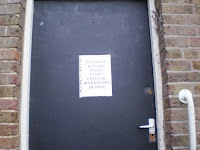
In 1987 my husband complained about changes in his work place - his employers,BT, had plonked computers on the desks of its office staff, part of a plan, according to him, to cut clerical support for the sales force. I got him to bring home the beastly machine because I had a dissertation on the go. Thus started my fascination with writing-related technology.
I'd attended the LSE Festival last year: an event called, 'How would a Robot Read a Novel' about a computer programme designed to to analyse a text. It was useless for detecting literary merit, but it could generate word strings and clusters from a text fed into it to indicate main themes and authorial attitudes. A novel which the author thought was mainly about football turned out to be about friendship and romance.
Ironically, I arrived at the Sheihk Sheikh Zayed Theatre on Kingsway disgruntled, because my local reading group was cancelled that morning: the staff had gone to protest about five libraries to be closed in the borough.
The panel were writers and publishers: Lionel Shriver, bestselling author and journalist; Sam Leith former Literary Editor at the Telegraph, whose first novel The Coincidence Engine, will be published in April 2011; Nigel Warburton, Senior Lecturer at the Open University,journalist and popular blogger; Tom Chatfield, journalist, Arts and Books Editor at Prospect magazine and author of Fun Inc.
The emphasis was on the relationship between author and reader. With rapid developments in communication and publication technologies, traditional borders between writers and readers have been blurred, creating a new relationship within a new, often interactive, space. The question raised was 'What does technology mean for the future of the author?'
Appropriately for an event in the London School of Economics, a burning issue was how to make a living from writing. With desk-top publishing so cheap, publishers so unaccommodating to new writers and books available to download for pennies onto a Kindle, it looks as if future authors will require a private income. Plus ça change, I thought.
One of the obvious facts about the Eng Lit 'Canon' is that with few exceptions books were written by members of the upper classes. Where you found a published author you found an existing income and the world depicted, along with its concerns, quite alien to those of ordinary people.
And that's how they liked it. The days may be gone when Muriel Spark was asked , 'Why are you even applying for a job in publishing if you don't have private means?', but there's still every sign that not much has changed. The literary shelves groan with Julians and Sebastians.
On the bright side, it looks as if traditional publishers will soon be about as relevant as blacksmiths.
'Is it a good time to be a new author?' asked a member of the audience, and the answer was yes. What with blogs, e-zines and email attachments, plus the ability to self-publicise through tweets and websites, a readership that wasn't possible before becomes accessible. Authors no longer rely on publishers getting their books into shops, after surviving the gatekeeping and cultural vetting process, but can be masters of their own publicity.
There was some regret about loss of bookshops and of books themselves as collectible artefacts but the reading experience between a Kindle and a printed page is not so different.
I thought this was a fascinating topic and one, no doubt, that will change with yet newer developments.












